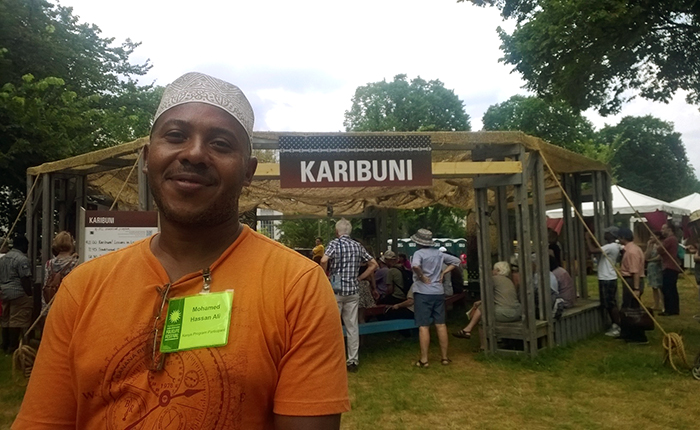Karibuni! Welcome to Kiswahili Language

Early visitors to the Folklife Festival Thursday morning were greeted with a “Karibuni!” at the Karibuni Workshop Stage. “Welcome!” The opening session in the Kenya: Mambo Poa program was a lesson in language led by Mohamed Hussan Ali, a native Kiswahili speaker from the coastal town of Lamu.
Kiswahili is the official language in Kenya and neighboring countries Tanzania and Uganda. It originated along the East African coast around the second century, when the preexisting Kingozi language merged with Arabic, Chinese, Indian, and other languages introduced through trade routes.
“It’s a cocktail of many other foreign languages,” Ali said, smiling.
Within Kiswahili, there are over fifteen dialects along the coast, as different communities borrow and transform foreign words, but it is recognized among the country’s forty-plus ethnic groups. Ali said most people in Kenya speak at least three languages: Kiswahili, their native “mother tongue,” and English which is now taught in urban schools.
Ali led the workshop audience in an introductory lesson of Kiswahili greetings and replies.
Hujambo? (Literally: Are you okay?)
Sijambo! (I’m well!)
Assalamu alaykum (Peace be with you)
Walaikum salam (And peace be with you)
*Swahili culture along the Kenyan coast is predominantly Islamic. Variations of these phrases are used throughout Muslim communities.
Shikamoo (I am holding your feet)
Marahaba (I am blessing you)
* The first is said to elders as a sign of respect.
Mambo (Literally: things, short for “how are things?”)
Poa! (Short for “things are good!”)
* This slang phrase was likely distorted by younger speakers so that elders could not understand.
Once we learned the basics, Ali moved onto a few sayings. Most Americans probably already know at least one Kiswahili proverb:
Hakuna matata! (There is no problem!)
* He noted that this is an abbreviation; in proper Kiswahili, it’s hakuna matatizo.
Mvumilivu hula mbivu (A patient mans eats a ripe fruit)
* He explained: “If you want to succeed in life, you have to be patient. Simple as that.”
Ali had to think for a minute about his favorite Kiswahili word, but he finally settled on bingwa: champion, not just applying to sports but to poetry and other arts too. How fitting for the Folklife Festival, where we are surrounded by artistic and athletic champions every day!
Do you have a favorite Kiswahili word? Tell us in the comments!
Elisa Hough is the editor for the Center for Folklife and Cultural Heritage and a certified word nerd.

